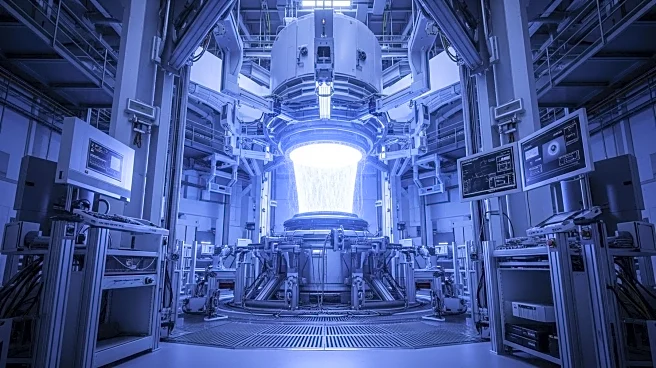What's Happening?
Commonwealth Fusion Systems (CFS), a Massachusetts-based fusion power startup, has successfully raised $863 million in a funding round that includes major investors such as Nvidia, Google, and Breakthrough Energy Ventures. The company aims to advance fusion technology into a commercial industrial endeavor. CFS has previously raised nearly $3 billion, making it the most funded fusion startup to date. The funds will support the development of Sparc, a prototype reactor expected to achieve scientific breakeven by 2027. This milestone would mean the fusion reaction produces more energy than required to ignite it. The Sparc reactor is crucial for proving the viability of fusion technology, although it is not designed to sell power to the grid.
Why It's Important?
The investment in Commonwealth Fusion Systems highlights the growing interest in fusion power as a potential limitless energy source. Fusion technology, if successful, could revolutionize the energy sector by providing a clean and sustainable alternative to fossil fuels. The involvement of tech giants like Nvidia and Google underscores the importance of advanced computing and AI in accelerating fusion research and development. This funding round also reflects a broader trend of increased investment in clean energy technologies, which could have significant implications for U.S. energy policy and the global transition to renewable energy sources.
What's Next?
CFS plans to begin construction on Arc, its commercial-scale power plant, in Virginia starting in 2027 or 2028, assuming Sparc does not reveal any major problems. The company is also developing its supply chain and seeking partners to build its power plants and purchase electricity. Google has already inked a deal to buy 200 megawatts from Arc. The success of Sparc and Arc could pave the way for future fusion power plants, potentially reducing costs and increasing scalability.
Beyond the Headlines
The development of fusion technology raises several ethical and environmental considerations. While fusion promises a clean energy source, the construction and operation of fusion reactors require significant resources and infrastructure. Additionally, the long-term impact on energy markets and geopolitical dynamics remains uncertain. The success of fusion technology could shift power balances and influence global energy policies.









